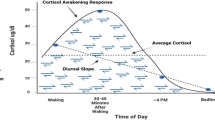Abstract
Rationale
Cortisol hypersecretion is regarded as important in the pathophysiology of major depression. However, recent studies in community-based samples have been inconclusive.
Objective
To determine whether acutely depressed, medication-free subjects show an exaggerated release of cortisol in saliva in relation to awakening.
Methods
We studied the pattern of waking salivary cortisol in 20 unmedicated acutely depressed subjects and 40 healthy controls.
Results
In both groups, salivary cortisol increased rapidly after waking, peaking at 30 min. Overall, patients with acute depression secreted approximately 25% more cortisol than controls, though 60 min after waking, their cortisol levels were similar.
Conclusions
Depressed patients in the community appear to have increased early morning cortisol secretion, but the demonstration of this effect requires control for time of waking.

Similar content being viewed by others
References
Bhagwagar Z, Hafizi S, Cowen PJ (2003) Increase in concentration of waking salivary cortisol in recovered patients with depression. Am J Psychiatry 160:1890–1891
Clow A, Thorn L, Evans P, Hucklebridge F (2004) The awakening cortisol response: methodological issues and significance. Stress 7:29–37
First MB, Spitzer RL, Gibbon M, Williams JBW (1997) Structured Clinical Interview for DSM-IV Axis I disorders—Clinician Version (SCID-CV). American Psychiatric Press, Washington, DC
Goodyer IM, Herbert J, Tamplin A (2003) Psychoendocrine antecedents of persistent first-episode major depression in adolescents: a community-based longitudinal enquiry. Psychol Med 33:601–610
Lupien SJ, de Leon M, de Santi S et al (1998) Cortisol levels during human aging predict hippocampal atrophy and memory deficits. Nat Neurosci 1:69–73
Maes M, Calabrese J, Meltzer HY (1994) The relevance of the in- versus outpatient status for studies on HPA-axis in depression: spontaneous hypercortisolism is a feature of major depressed inpatients and not of major depression per se. Prog Neuro-psychopharmacol Biol Psychiatry 18:503–517
Malach M, Imperato PJ (2004) Depression and acute myocardial infarction. Prev Cardiol 7:83–90 (quiz 91–2)
Otte C, Marmar CR, Pipkin SS, Moos R, Browner WS, Whooley MA (2004) Depression and 24-hour urinary cortisol in medical outpatients with coronary heart disease: the heart and soul study. Biol Psychiatry 56:241–247
Posener JA, DeBattista C, Williams GH, Chmura Kraemer H, Kalehzan BM, Schatzberg AF (2000) 24-Hour monitoring of cortisol and corticotropin secretion in psychotic and nonpsychotic major depression. Arch Gen Psychiatry 57:755–760
Pruessner M, Hellhammer DH, Pruessner JC, Lupien SJ (2003) Self-reported depressive symptoms and stress levels in healthy young men: associations with the cortisol response to awakening. Psychosom Med 65:92–99
Raff H, Raff JL, Duthie EH et al (1999) Elevated salivary cortisol in the evening in healthy elderly men and women: correlation with bone mineral density. J Gerontol A Biol Sci Med Sci 54:M479–M483
Rozanski A, Blumenthal JA, Kaplan J (1999) Impact of psychological factors on the pathogenesis of cardiovascular disease and implications for therapy. Circulation 99:2192–2217
Rudisch B, Nemeroff CB (2003) Epidemiology of comorbid coronary artery disease and depression. Biol Psychiatry 54:227–240
Strickland PL, Deakin JF, Percival C, Dixon J, Gater RA, Goldberg DP (2002) Bio-social origins of depression in the community. Interactions between social adversity, cortisol and serotonin neurotransmission. Br J Psychiatry 180:168–173
Ward AM, Syddall HE, Wood PJ, Dennison EM, Phillips DI (2004) Central hypothalamic–pituitary–adrenal activity and the metabolic syndrome: studies using the corticotrophin-releasing hormone test. Metabolism 53:720–726
Wust S, Wolf J, Hellhammer DH, Federenko I, Schommer N, Kirschbaum C (2000) The cortisol awakening response—normal values and confounds. Noise Health 2:79–88
Young AH, Gallagher P, Porter RJ (2002) Elevation of the cortisol–dehydroepiandrosterone ratio in drug-free depressed patients. Am J Psychiatry 159:1237–1239
Acknowledgements
The study was supported by the Medical Research Council. The authors thank Alison Reed for technical assistance.
Author information
Authors and Affiliations
Corresponding author
Rights and permissions
About this article
Cite this article
Bhagwagar, Z., Hafizi, S. & Cowen, P.J. Increased salivary cortisol after waking in depression. Psychopharmacology 182, 54–57 (2005). https://doi.org/10.1007/s00213-005-0062-z
Received:
Accepted:
Published:
Issue Date:
DOI: https://doi.org/10.1007/s00213-005-0062-z




